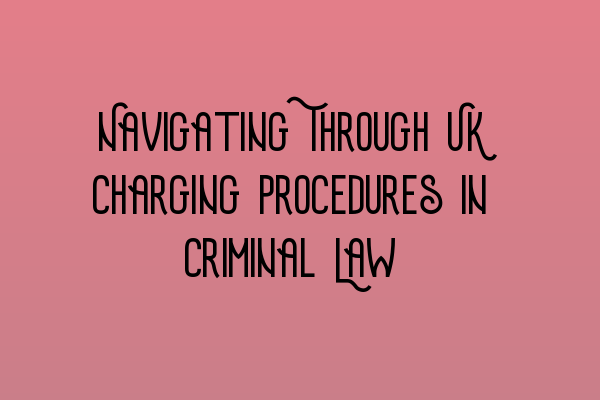Navigating Through UK Charging Procedures in Criminal Law
When it comes to criminal law, understanding the charging procedures in the UK is essential. Whether you are a solicitor, law student, or simply interested in learning more about the legal system, this article will provide a comprehensive guide to navigating through the charging procedures in criminal law.
Understanding the Charging Procedure
In the UK, charging procedures are governed by the Crown Prosecution Service (CPS), which is responsible for reviewing and deciding on whether to charge individuals with criminal offenses. The CPS works closely with the police to gather evidence and build a case against the accused.
Charge Decision
After conducting an investigation, the police will forward the case to the CPS for a charge decision. The CPS will review the evidence and determine whether there is sufficient evidence to proceed with the case. This decision is based on the Full Code Test, which considers whether there is a realistic prospect of conviction and whether it is in the public interest to prosecute.
Charge Types
Once a decision to charge has been made, the CPS can proceed with different types of charges, depending on the severity of the offense. Some common types of charges include:
- Murder
- Assault
- Theft
- Drug offenses
- Fraud
The Charging Process
Once an individual has been charged, they will be notified and summoned to appear at court. The charging process involves several stages, which are:
First Appearance
At the first court appearance, the charges will be read out, and the accused will have the opportunity to enter a plea. It is important to seek legal representation at this stage to ensure your rights are protected and to receive proper legal advice.
Bail Hearing
If the accused is not held in custody pending trial, a bail hearing will be conducted. The court will consider factors such as the likelihood of the accused fleeing or reoffending when deciding on bail conditions.
Case Management
During the case management stage, the court will set a timetable for the progression of the case. This includes setting trial dates, disclosure deadlines, and any pre-trial hearings that may be necessary.
Preparation for Trial
Prior to trial, both the prosecution and defense will gather evidence, interview witnesses, and prepare their respective cases. This stage is crucial in building a strong defense or prosecuting the accused effectively.
Trial
At the trial, the prosecution will present their case, including witnesses and evidence, and the defense will have the opportunity to cross-examine and present their own evidence. The judge or jury will then make a decision based on the evidence presented.
Sentencing
If the accused is found guilty, the court will proceed to sentencing. The severity of the offense and any aggravating or mitigating factors will be considered when determining the appropriate sentence.
Conclusion
Navigating through the charging procedures in criminal law in the UK can be complex and overwhelming. Understanding each stage of the charging process is crucial for anyone involved in the criminal justice system. Whether you are a solicitor, law student, or an individual facing criminal charges, seeking professional legal advice is essential to ensure your rights are protected and to navigate through the process effectively.
For further practice and preparation materials for the SQE 1 and SQE 2 exams, you can check out our related articles:
- SQE 1 Practice Exam Questions
- SQE 1 Practice Mocks FLK1 FLK2
- SQE 2 Preparation Courses
- SQE 1 Preparation Courses
- SRA SQE Exam Dates
